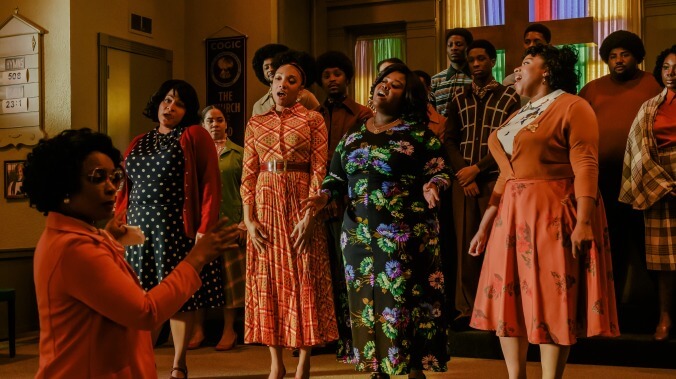In the Clark sisters’ home, Mama Clark considers the word “easy” a swear. “We don’t do easy,” she explains to her daughters after waking them up at three in the morning to record a song the Lord sent her in a dream. “We do excellence.” Thus, The Clark Sisters: The First Ladies Of Gospel, Lifetime’s biopic of the women who brought gospel music to the mainstream, begins. Director Christine Swanson built a career on making moving biopics for television, including Love Under New Management: The Miki Howard Story, which she filmed for TV One. Swanson presents Camille Tucker’s script as the moving struggle of five women working together to make their mother’s dream come true. Unfortunately, trying to tell six individual stories over a 50-year span in an hour and a half proves too tall a mountain to climb.
There’s a lot to love about the film, including Tucker’s dialogue, which is aces. The middle American Black mama one-liners cut two ways, deep wisdom or flaming insult. “‘Sorry’ can’t buy one shoe,” and “All I gotta do is stay Black and die,” ring authentic in of the mouths of mothers and daughters who live and work together. The film is beautifully shot by Jason Tan, who ensures the Black American church—with its many varieties, from old brick landmarks and modern cement simplicity—is magnificently portrayed. The music, it should go without saying, is spectacular: Gospel lovers can rejoice, for the songs are plentiful. But it’s a singular performance that makes this movie sing.
“I’m gonna make you stars for Jesus,” Aunjanue Ellis declares as she enters the role of Mattie Moss Clark. Cheekily referred to as the Joe Jackson of the group, mama Mattie is the drive behind the Clark sisters, embarking on a mission from God to spread the gospel. Maddeningly, everyone stands in her way: An abusive husband tells her she doesn’t wear ambition well, the board of her congregation removes her from their ranks when she sings at the Grammys with her daughter, and even her daughters doubt how far their talent can take them. But through it all, Mattie Moss remains steadfast in her conviction of her faith.
Ellis’ performance as Mattie is enough to boost opinion of the film as a whole. Driven, passionate, and certain of her righteous calling, Mattie is an absolute force of a choir director, and she’s much harder on her children than she is on any of her students. But Ellis also imbues the role with a hint of self-doubt. She brings a longing to the character many would have seen as hardened in a way that’s too quick for anyone in the scene to catch, but long enough to register with the audience. It’s brilliant screen work from an experienced actress who deserves more recognition.
The story of Mattie Moss Clark is the story of the Clark Sisters. It’s her dream motivating the launch of their careers, and if the focus remained on Mattie—how she was disappointed by her daughters, how they exceeded her expectations, and how she struggled to figure out how to be a radical businesswoman and a mother—the film would have been much more grounded. Instead, it feels like a chorus of Clark sisters, each with their interpretation of events, presented in a way that wouldn’t offend anyone person in the group. For example, Denise Clark (Raven Goodwin) is at constant odds with her mother. Denise’s three children out of wedlock cause concern for her sisters, who worry her behavior could turn traditional listeners away from their music. She eventually leaves the group and makes a scene at their mother’s funeral when she feels excluded from the procession to the burial site. But because this story belongs to all six women, and not just one, there isn’t a resolution on anyone’s feelings here. They fight, and then Denise disappears from the screen. A quick conversation informs the audience that the family reached out to her for a reunion, but not much attention is given to how her leaving impacts the dynamic of the group.
Large shifts happen throughout The Clark Sisters, and without the tether of a single character, or even a singular theme, the whole story seems emotionally disconnected. What it lacks in connectivity, the film makes up in performance. Raven Goodwin brings rebellious joy as Denise, and Christina Bell makes a glorious debut as Twinkie, the daughter who lives under her mother’s thumb.
The vocal performances soar, but the story seems to be the same one America idolizes in its young successes. Domestic abuse, poverty, and an uphill battle tracks through all of the great Black American vocalist biopics, like Ray, What’s Love Got to Do With It, and Introducing Dorothy Dandridge. The most unique angle of this production is the stage mother, a theme that hasn’t been cinematically explored for Black Americans. By the end of the film, the burning question is who was Mattie Moss? Where did her life begin, and why did she feel so called to do the work of God? The story of the Clark sisters may be muddled by opinion, but Miss Mattie Moss Clark’s story rings clear as a bell. It’s her life that guided the conception of the girls, the formation of the group, their rise to the top, and their disbanding. In all but name, she is the driving force and heart of the film.














![HBO teases new Euphoria, Larry David, and much more in 2026 sizzle reel [Updated]](https://img.pastemagazine.com/wp-content/avuploads/2025/12/12100344/MixCollage-12-Dec-2025-09-56-AM-9137.jpg)



























